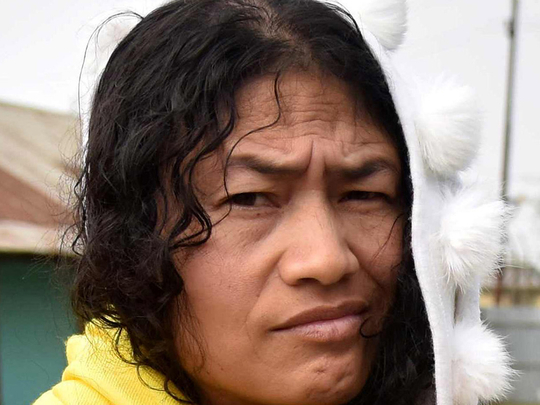
As O. Ibobi Singh walked out of the polling station after casting his vote in the State legislative assembly elections in the Indian state of Manipur on March 8 morning, he was confronted by a television journalist who wanted to know what the chief minister thought of Irom Sharmila who was contesting against him. The dour looking chief minister broke into a wide grin, waved his hands dismissively, and walked off.
Three days later, on March 11, the votes were counted. Ibobi got 18,649 and was re-elected for the fourth time. Sharmila came fourth and ended up with 90 votes. As one report wryly noted, even the none-of-the-above (NOTA) option obtained more votes (143) than her.
The humiliation must have hurt. No one may have expected her to win against the chief minister. However, it is hard to witness her lose with this margin. A weeping Sharmila declared that she will never contest elections again. On March 12, she left for an ashram outside Manipur to spend time in self-reflection.
Ibobi has been the chief minister of Manipur since 2002. Two years earlier, in 2000, Sharmila had started her indefinite hunger strike in protest against the much-hated Armed Forces (Special Powers) Act (AFSPA), the law that gives soldiers the right to shoot and kill. Since then, both of them have grown very powerful in their own right; one as a wily, undefeatable political leader of an ungovernably chaotic land and the other as a human rights icon of global renown. So when Sharmila abruptly decided to end her 16-year hunger strike last year and declared that she will enter electoral politics, much interest and controversy was aroused. When she chose to directly contest against the chief minister in the latter’s own home constituency, Manipur watchers were entranced.
It will take some time for us to fully analyse how we come to this and the implication it may have, not just for Sharmila, but the credibility of the campaign against AFSPA itself. It is clear that Sharmila and her party, the People’s Resurgence and Justice Alliance (PRJA) which was also set up last year, have never really got political traction. They make occasional news in the so-called “national media”. They appeal to a section of the idealistic young who are fed up of the present system. They raised funds online and nominated a Muslim woman alongside Sharmila, which are novelties in Manipur’s politics. Leaders from other parties, like Arvind Kejriwal of the Aam Admi Party (AAP) have donated.
But, they were invisible in the state media throughout the election season. As Dr. Akoijam of Jawaharlal Nehru University in New Delhi said, “Sharmila seems to draw interests from people except voters”. As it happens, the defeat was comprehensive. Two other nominees of the PRJA obtained 573 and 33 votes each.
In an interview last December, Sharmila set her sights beyond this election. The hill-plain divide, clean politics and of course, the AFSPA, she said, were high on her agenda. After this humiliation at the hands of those she considers her very own, though, things were in a blur. At this stage, going off on a monthlong meditation retreat seemed like the only logical thing to do.
— The writer is an independent researcher from Manipur












